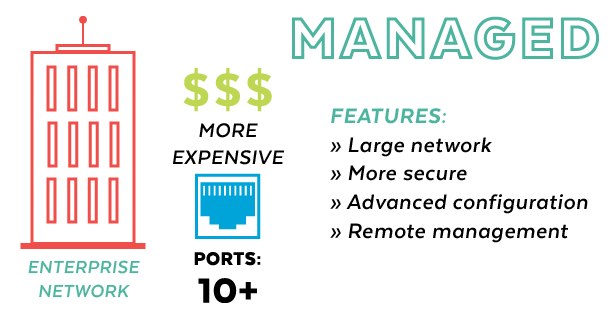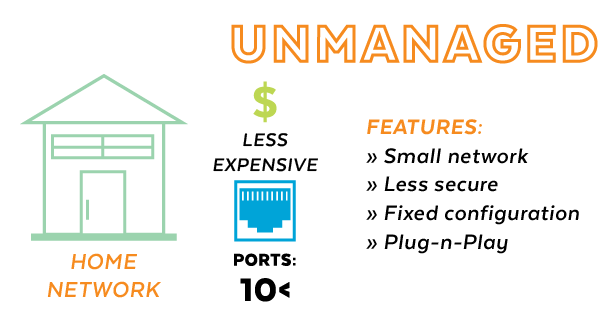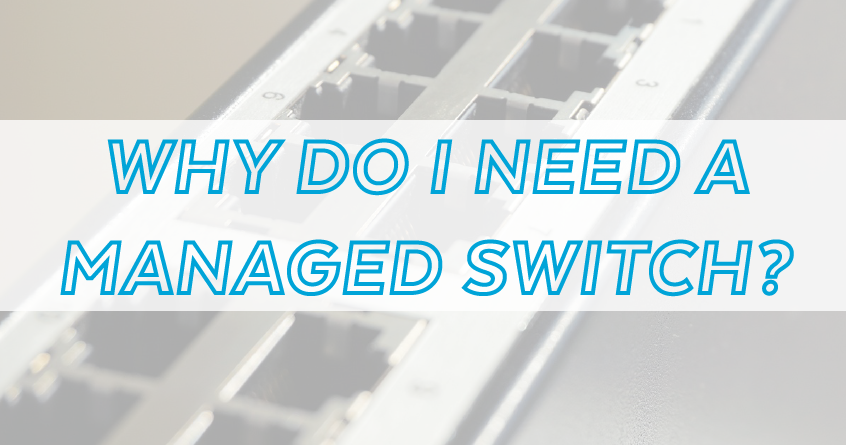Any time you’re dealing with a complex network environment, it’s vital that you have the right resources on hand to deal with any challenges that might come your way. This includes ensuring you have the right amount of bandwidth for key tasks. Power over Ethernet, a technology that allows for the delivery of both power and data within the same cable, is a highly effective way to expand your network. A managed switch may be necessary for the proper configuration of PoE networks.
What is PoE?
PoE, or Power over Ethernet, transmits electrical current and data packets simultaneously over the same Ethernet cable. With PoE, companies can create more effective network configurations because PoE removes the limitation of keeping data-connected devices near power outlets. PoE technology allows for faster data speeds because it does not require installing separate electrical wiring, which often leads to decreased installation expenses.
What is a Managed PoE Switch?
In contrast to an unmanaged switch, managed switches offer a higher level of configuration and customization. When you install an unmanaged switch, you simply plug in the equipment and allow it to run. With a managed switch, on the other hand, you’ll have the freedom to set up devices according to your unique business needs while also having access to data on the performance of those devices. For example, the D60-044-91 managed 12 industrial PoE switch offers a multi-port PoE option that can deliver high-speed connectivity while providing the power needed for all your critical devices. The D60-044-91 enables better control of networks and data frames, giving you complete control of the key elements in your network.
 Why Industrial is Important
Why Industrial is Important
Industrial switches are important for many reasons. Most notably, they’re tough and designed to last. They can withstand both higher and lower temperatures, which means that they can handle diverse weather conditions, and they can operate in indoor and outdoor environments for maximum connectivity wherever it’s needed. Industrial strength is key for business applications as there are fewer maintenance requirements.
Why Power Capability is Important
When setting up a PoE system, it’s crucial to have a power supply that can handle up to 90W to ensure that all devices receive adequate power. A 90W capacity will provide reassurance that you can support more sophisticated powered devices, including IP cameras, high-performance wireless devices, and more. By paying careful attention to the PoE budget on your chosen switch, you can ensure that you have the power you need to run your equipment.
How Do Managed and Unmanaged Switches Differ?
Managed and unmanaged switches have some key differences that are important to consider when determining the best solution for your business.
Unmanaged Switches: The Plug and Play Option
If you’re looking for a fast configuration that you can simply plug in and hit the ground running, an unmanaged switch may fit your needs. You don’t have to configure unmanaged switches in advance, nor do you need to set up an interface that will allow you to control the device and its configuration. Unmanaged switches are a simple option for managing your PoE needs.
 Security Concerns
Security Concerns
When selecting a PoE switch, it’s important to make sure that you have the right level of security for your specific needs. Unmanaged switches do not provide much security, which means that it may be easier for bad actors to gain unauthorized access to your network. Depending on what devices you’re powering over your PoE solution, you may find that the lack of security creates serious problems. With a managed switch, on the other hand, you can prevent unauthorized access to your network, manage authentication needs, and even provide “storm control” that can protect against Distributed Denial of Service attacks. With these security measures in place, you can feel much more confident about your network.
Scalability
If you’re looking for an option that will allow your business to grow, consider the advantages of a managed switch. While managed switches allow scalability and built-in opportunities for expansion, unmanaged switches may offer fewer customization options, which means you may not be able to grow your platform later.
Improved Capability
With managed switches, you have improved overall capability. Managed switches provide the ability to control network functioning, including software performance. An unmanaged switch will not. Administrators can customize things on a managed switch, like signal mapping, device management, monitoring, and cable diagnostics, to set things up according to the needs of end users. In contrast, unmanaged switches act more like a canal that water flows through without any hindrance. It’s more of a pass-through, which works well in simpler networks.
If You’re Still Not Sure, Buy Managed
If you’re on the fence about the right switch for your PoE solution, go with managed. Even if it’s not essential for the devices currently on your network, you will likely find that a managed switch offers benefits for both your hardware and software solutions. Furthermore, a managed switch offers more room for expansion over time. Managed switches grow with your business and won’t need to be replaced as your business scales. Managed switches also offer security features appropriate for both enterprise and commercial applications, allowing you to segment traffic and access while still providing the level of protection you’ll need for your network.
Are you ready to choose a switch for your PoE solution? Do you need more help finding the right hardware to deliver effective PoE and leverage all the benefits? Reach out today to learn more about how we can help you achieve your goals.

